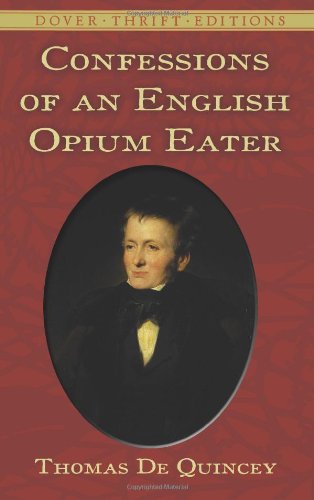Title: Confessions of an English Opium-Eater
Author: Thomas de Quincey
Date: 1821
Publisher: Dover
ISBN: 0-486-28742-4
Length: 70 pages
Quote: "Think of me as of one, even when four months had passed, still agitated, writhing, throbbing, palpitating, shattered."
Thomas de Quincey wrote two very distinct versions of his opium memoir. This first version is, according to the Dover editors, "the more impressive" for its "readable intensity." The second version is "much longer, more verbose." Students who need to read one edition of Confessions of an English Opium-Eater and have a free choice as to which, therefore, will probably prefer this one.
It's not, however, the whole story. Like many drug addicts, de Quincey struggled through recovery, wrote on page 70 of this edition "I triumphed," published his memoir, was employed on the strength of his having recovered...and then backslid again, and again, and again. He lived until 1859 but, as the Dover editor puts it, "the author's personal indulgences had affected his prose," making his writing "rambling, involuted and flaccid. An additional result of de Quincey's opium abuse was the hopeless disorder of his personal papers: intending to include...sections of greater length devoted to his opium dreams, the nonplussed writer discovered that he had misplaced the countless scraps on which they were recorded...his memory as to their contents and whereabouts was a blank."
His use of opium was, of course, legal at the time. His testimony about how addictive it was, and how unhelpful, was cited in the debates about subsequent legislation against addictive drugs. Laudanum, the beverage form of opium, continued to be sold in the English-speaking countries for almost a hundred years after de Quincey wrote about his addiction and recovery. It was given to abused and neglected children, to prostitutes, and to people dying of incurable diseases (groups that overlapped to a considerable extent) all through the nineteenth century. Laudanum was not, in fact, taken off the market until its refined derivative, heroin, was available, nor was heroin banned until the current refinement, morphine, was available; it's still legal for doctors to prescribe morphine in some situations.
If we know what became of de Quincey, why do we need to slog through his story? Because he does give us an interesting picture of how poor students lived at the turn of the nineteenth century. He "was reduced to only one meal a day," and sometimes "the single meal, which I could venture to order, was coffee or tea," or "blackberries, hips, haws, &c." (things he picked in hedgerows and uncultivated fields) and "the casual hospitalities which I now and then received, in return for such little services as I had an opportunity of rendering"--he would write letters for food. His relationships with landlords, tutors, prostitutes, derelicts, and wealthy patrons remain as interesting as a novel, and shorter than most.
Although de Quincey no longer needs a dollar, in order to afford anything better than wild blackberries and rose hips I am still obliged to ask $5 per copy of his book + $5 per package if you buy it here. The $5 per package shipping charge, however, allows you to order Confessions of an English Opium Eater together with one or more Fair Trade Books and pay only the one shipping charge.
I've been decorating book reviews on this site, for Google + purposes, with various cute public-domain images from Morguefile, Wikipedia, or Pixabay. This doesn't satisfy me; I think it looks distracting, no matter how lovely the pictures may be. Amazon refuses to provide this site (Blogjob) with clickable photo links you could use to compare prices for this book at Amazon. Here's a picture of the book, although it's not a link, ganked from http://ecx.images-amazon.com/images/I/41PoeyKtW4L.jpg . (Note that the Dover Thrift Edition I physically own and have for sale, at the time of writing, has a different cover--no portrait.)

(The problem with the clickable links was probably something to do with "i-frames," which have somehow been declared forever out of bounds in my part of the world, although they're what a lot of the web hosting sites that promise to facilitate payment for Online Stores rely on...often completely. Amazon does offer other ways to generate clickable links; in this post they appear as text. Long-tailed tags were 1810’s, addiction, opium and opiates, poor student in England, prostitution,recovery.)
No comments:
Post a Comment